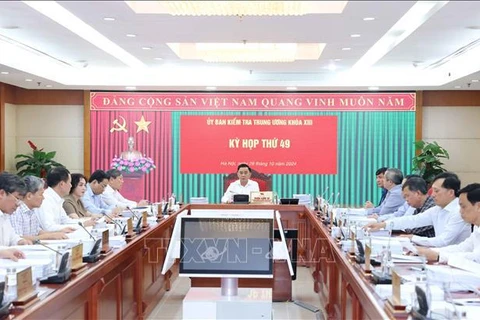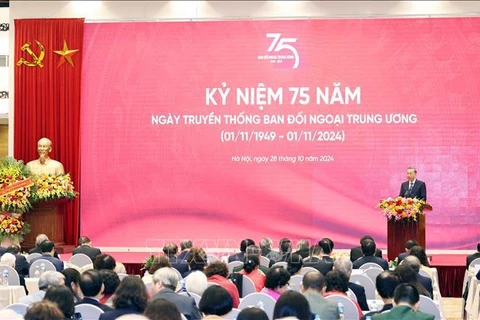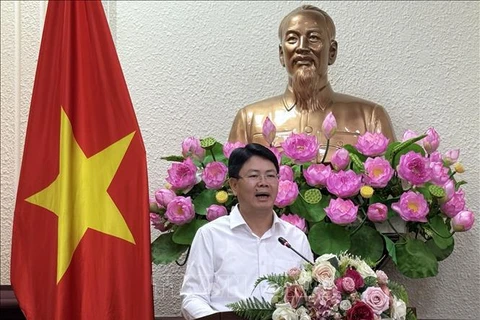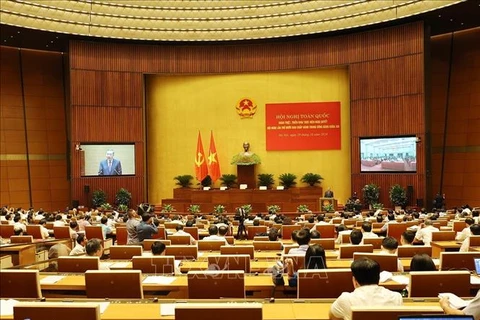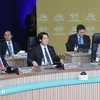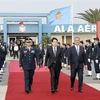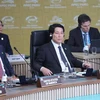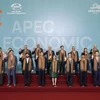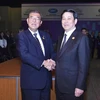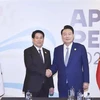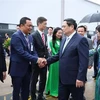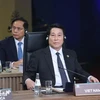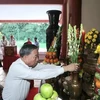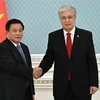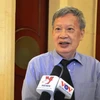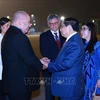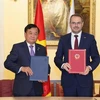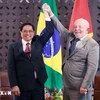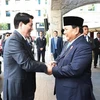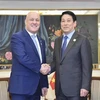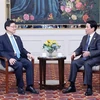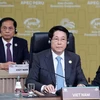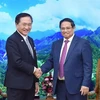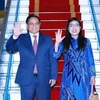
Hanoi (VNA) - Throughout its leadership, the Party has continuously innovated and refined its methods of leadership and governance to meet the demands of the times. This approach has enabled the country to achieve significant historical milestones, establishing the country's strength, potential, position, and international reputation.
The article titled “Continuing to strongly innovate Party's leadership and ruling methods - an urgent need of the new revolutionary period” by Party General and President To Lam emphasizes that under the Party's leadership, through democratic and scientific governance methods that are regularly updated to align with the demands of each period, Vietnam's revolutionary efforts, particularly in the renewal process, have achieved remarkable successes.
From a country that had no name on the world map and was heavily devastated by war, Vietnam has become a symbol of peace, stability, hospitality, and a destination for international investors and tourists.
Notably, Vietnam has established a stable political system with the mechanism of "the Party leadership, the State management, and the people’s mastery”. The Party's organisational structure has undergone multiple refinements, gradually taking shape and continuing to innovate and restructure.
Stable political institutions have been formed with the mechanism of "Party leadership, State management, people's mastery". The Party's organisational system has gradually taken shape after many times of reshuffling, and continues to be innovated and rearranged. The political system, the core of which is the socialist rule-of-law State of the people, by the people and for the people, has been built and perfected, affirming its role in managing and operating all activities of social life.
However, many shortcomings and limitations remain in the renovation of Party leadership. Some major policies and orientations of the Party have yet to be timely and fully institutionalised, or institutionalised with a low level of feasibility. The overall model of the political system has not yet been completed; the functions, tasks, authority and working relationships of organisations, individuals, and holders of top positions remain unclear; while decentralisation and delegation of power are not strong enough.
In an interview with VietnamPlus on the Party leader’s article, Nguyen Tuc, a member of the Presidium of the Vietnam Fatherland Front Central Committee and Chair of the Advisory Council on Culture and Society, emphasized that this document is extremely useful and serves as a guide for local party committees and authorities to implement effectively.
Contribute to tightening discipline and regulations within the Party
The theme of the article conveys the author's intention: in the new context, there is a need to change leadership and governance methods.
The political report of the 13th Party Congress highlights that, after 30 years of renovation, the country has attained the stature, potential, standing, and prestige it enjoys today.
Additionally, the 13th Congress has set clear objectives for 2030, marking the 100th anniversary of the Party's founding, as well as goals for 2045, which will mark the 100th anniversary of the establishment of the Socialist Republic of Vietnam.
To achieve these goals, the first step is to further strengthen the process of innovation. The phrase “continuing to strongly innovate” has been highlighted in the article.
With the proposed direction, it is essential for the Party to take the lead and implement breakthrough measures. This includes “continuing to strongly innovate the Party’s leadership methods to achieve the best results.”
To achieve that innovation, it is crucial to recognise both strengths and weaknesses.
For over 94 years of leading the revolution, our Party has continuously studied, developed, supplemented, and perfected its leadership methods, and enhanced its leadership and ruling capacity. This is the key factor ensuring the Party is always pure and strong to steer the revolutionary ship through all challenges to victories. The country is now at a new historical moment and in a new era – the one of the nation's rise, when the requirement for the bold innovation of leadership methods and the improvement of leadership and ruling capacity to drive the nation forward is increasingly pressing.

The strengths are evident in the nearly 40 years of renewal, during which Vietnam has never had such fortune, potential, position and prestige as it does today. According to Tuc, a key point in the article is that if Vietnam becomes complacent with the achievements without acknowledging the shortcomings, the country will not be able to advance further.
However, many shortcomings and limitations remain in the renovation of Party leadership. One of which is the issuance of many documents, some of which are too general, overextended and overlapped, while supplementation, revision or replacement is slow. Some major policies and orientations of the Party have yet to be timely and fully institutionalised, or institutionalised with a low level of feasibility.
In the article, the Party leader said resolutions of Party committees and Party organisations at all levels must be concise, easy to understand, easy to remember, easy to absorb and easy to be implemented.
Tuc stated that the 13th Party Congress emphasized the need to continue building a socialist rule-of-law State of the people, by the people and for the people. In his article, Lam also mentioned the current overlaps and other shortcomings. He said there are places where the Party has taken over the government’s role, while in others, it has been too lax. Therefore, the comprehensive reforms mentioned are absolutely necessary, he noted.
Even the relationship between the Party and the government must be clarified so that each position and individual performs their functions and duties correctly. Additionally, the relationship between the Party and mass organisations, especially the Vietnam Fatherland Front, is crucial. The Party's platform for building the country during the transitional period to socialism (amended and developed in 2011) clearly states: “The Communist Party of Vietnam is both a member and the leader of the Front."
Although regulations regarding the Party's leadership over the Front exist, Tuc said some areas still struggle with implementation, and the training of personnel has also faced challenges, with certain party committees not performing well in this regard.

Tuc further emphasizes that the Party's leadership method should include criticism and self-criticism. In reality, many cases handled by the Party Central Committee’s Inspection Commission have highlighted a lack of democratic centralism. In some areas, officials and party members are still hesitant to fight against wrongdoings due to concerns about personal relationships and avoidance, which underscores the need to implement responsibilities effectively and systematically. This approach is essential to avoid the mistakes seen in some regions that led to the disciplinary action against key leaders, said Tuc.
From the article, Tuc said there should be a focus on streamlining the apparatus and organisation of Party agencies so that they truly become the intellectual core, the "general staff", and the vanguards leading state agencies. If the Party aims to innovate its leadership methods, it must first innovate its own leadership.
Recently, the quality of personnel in some party committees has not been exemplary in terms of both virtue and talent. Therefore, General Secretary Lam’s call to focus on streamlining the apparatus and organisation of Party agencies so that they truly become the intellectual core, the "general staff", and the vanguards leading state agencies is highly relevant.
This involves creating advisory agencies that are lean and efficient, with political integrity, professional competence, and a deep understanding of their work.
Additionally, it is necessary to research and promote the merger of some advisory and support agencies of the Party.
In reality, the Party Central Committee has issued documents encouraging individuals to think creatively, act decisively, and take responsibility. However, according to Tuc, in some areas, this has not been effectively implemented, leading to a culture where officials may prefer self-criticism within the Party rather than facing criminal prosecution.

Tuc resonate with the content in the article that emphasizes the need to continue innovating inspection and supervision work; to enhance the application of information technology and digital transformation in the Party's activities.
The Party's role in inspection and supervision is crucial for improving the effectiveness of work and ensuring that resolutions are implemented efficiently. It is essential for the Party and State apparatus to operate effectively, adhering to guidelines and policies, matching the right people to the right tasks, he added.
Timely identification of new factors, innovative practices, and correction of deviations or prevention of wrongful acts and violations of Party regulations and state laws is vital./.
